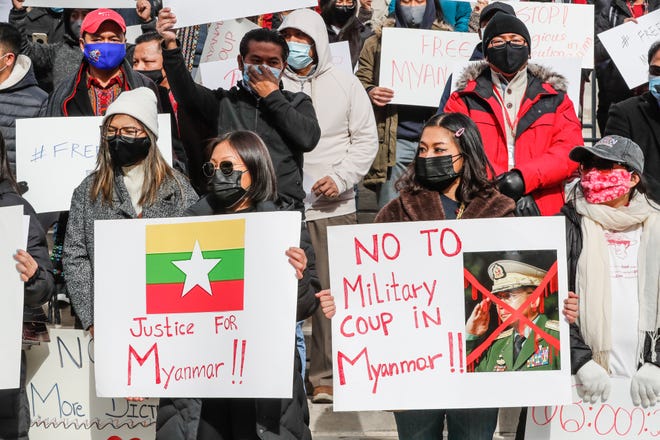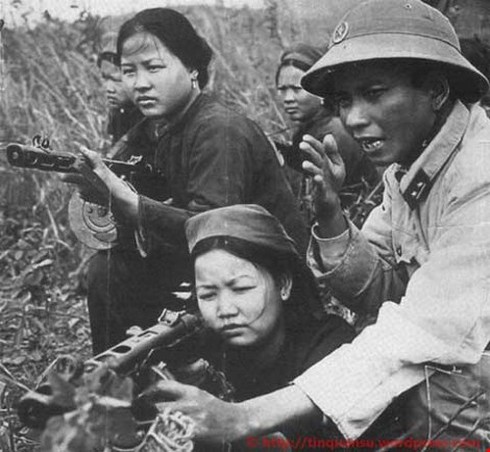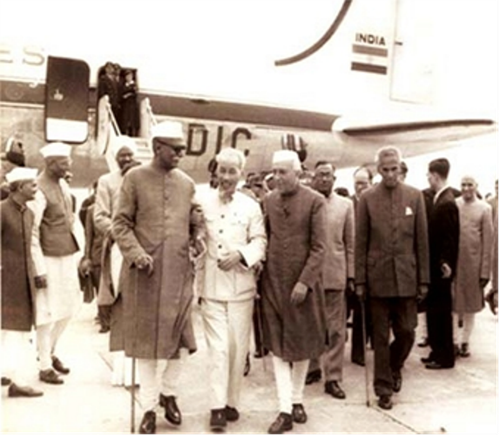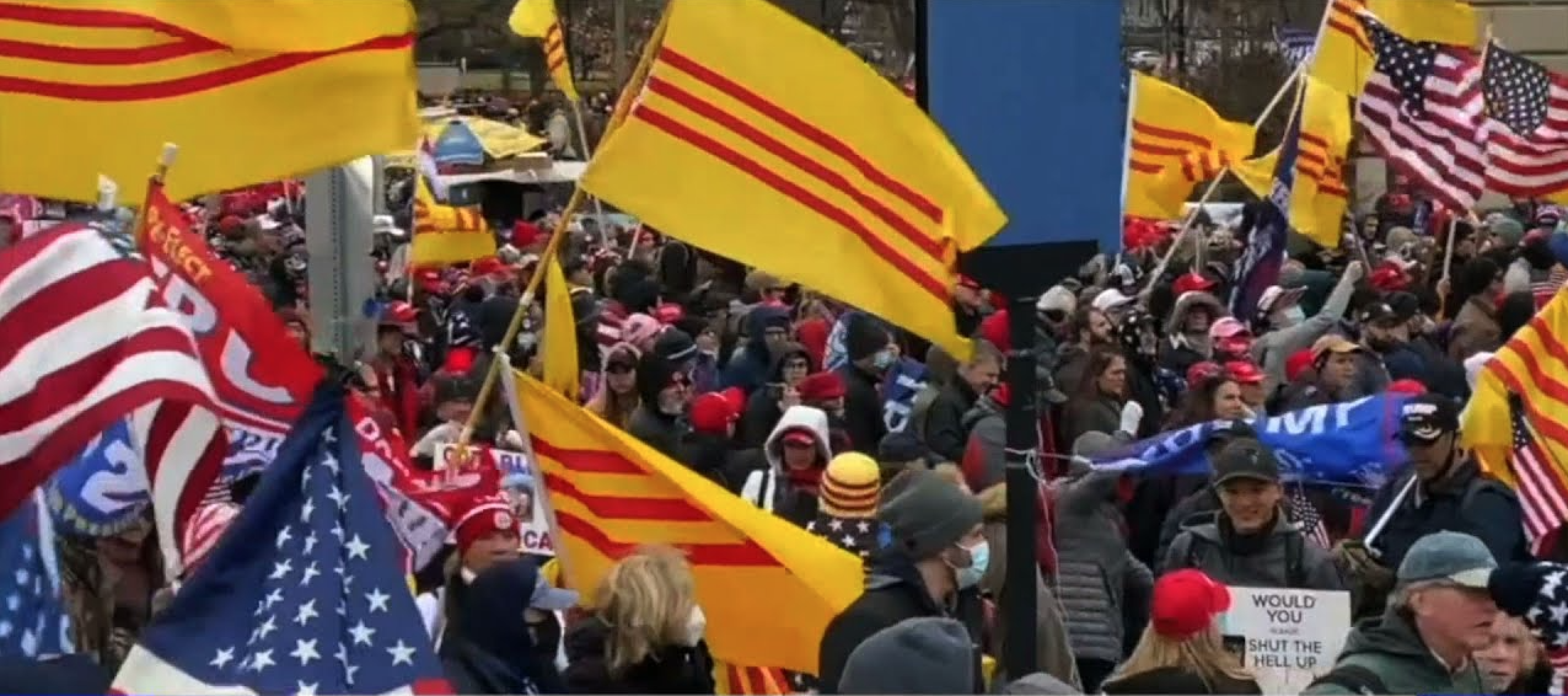India and Vietnam chose to become the outcasts in the crisis of Myanmar. And there are some reasons to know.
The protests in Myanmar have been the biggest since the 1988 Uprising in Myanmar, and the number of fatalities is rising days by days, nights by nights - triggered by the coup on 1 February 2021. This has triggered widespread international condemnation, but attempts to pass out a solution over the coup d'etat, was not successful, because of counter-attempts to block the condemnation by China and Russia - both Beijing and Moscow regard it as "internal affairs" of Myanmar.
Later, it was reported that not just China and Russia; there are two other nations on the list of trying to prevent condemnation on the Myanmar junta. India and Vietnam are the two nations being on the list, and this has led to criticism that New Delhi and Hanoi are "playing on the lives" of innocent Burmese people being gunned down by Tatmadaw soldiers.
As the world concentrates its eyes on Russia and China, so does India and Vietnam. However, the decision by both the governments of India and Vietnam, as seen outside a shameful act of support for the junta, may imply something deeper that, if not digging in, we may never know.
 |
| Burmese protesters in solidarity with their fellows at home in Indianapolis. |
Vietnam and the Tatmadaw
Speaking about Vietnam, it is not hard to realise. Vietnam is politically similar in structure to China, both are governed by a single party with little rights for political freedom, repressive police states, and at the same time have embraced economic capitalism and market system. So naturally, Vietnam and China, both communist states, happen to be getting along well.
But relations are far from just in a dreamland. Vietnam and China do share a close political system, but is not near being a full-time friend, if not to say, the relationship between Vietnam and China is not friendly at all. There is a deep anti-Chinese sentiment among Vietnamese population, one of the world's highest after Japan. This is rooted in the history of wars between the two states. In contemporary era, despite China supported North Vietnam, the Hanoi regime didn't ally with Beijing but rather Moscow when the Sino-Soviet split occurred. Outraged, Mao Zedong hosted Richard Nixon in 1972, and over the next few years, China increased its anti-Vietnamese activities to gain fervour from the West. Even when the communists unified Vietnam, by force, in 1975, the Chinese government practised a clear anti-Vietnamese policy, containing what Beijing saw as "Vietnamese imperialism and expansionism", supporting anti-Vietnamese, separatist groups like the FULRO (United Front for the Liberation of Oppressed Races) and the Hmong rebels of Vang Pao in Laos. It was demonstrated by the 1979 Sino-Vietnamese War, a war that saw Chinese military performed poorly in an attempt to force Vietnam out of Cambodia, which was ruled by Beijing's ally Pol Pot. Subsequent border wars and repeated incursions to short-lived invasions spanned between 1979 to 1990, and the attack on Johnson Reefs in 1988, entrenched back the eternal scepticism against China even among Vietnamese communist leaders.
The Tatmadaw, though, certainly admired the Vietnamese regime that despite being a communist like China, still stood against Beijing even with little international supports. And this was when they tried to breakthrough, Vietnam was one of the kind they sought to establish.
 |
| The Vietnamese Army in 1979, and its women's militias. Vietnamese women has a reputation of brutality and fearless in a war, mine grew up fear my mom greatly. |
Already in 1986, two years before the failed uprising in Burma, Vietnam enacted a series of economic reforms to reintegrate with international community. The reforms were a complete success, while Myanmar was later impoverished by isolation. The junta of Myanmar looked on various governments to gain international access and was quick to appreciate Vietnam's reforms. Already in 2004, then Prime Minister, Khin Nyunt, paid a visit to Vietnam and sought to promote trades and military cooperation. At the time, Vietnam, despite successful reforms and a growing economy, remained a small player, so it could not deliver the opportunities for free.
 |
| Khin Nyunt visiting Hanoi, 2004. |
When Myanmar finally embarked on a series of economic and social reforms in 2011, Vietnamese government saw an opportunity to exploit. A number of Vietnamese companies began to invest in Myanmar, a newly, unknown market for many foreign investors that only began to open up to the world after half of a century under the junta. Two main Vietnamese companies emerged: the Hoang Anh Gia Lai Group, a private-owned company that once run a series of joint-estate ventures in Yangon before selling to another Vietnamese company, THACO. The other one however was far more popular, Viettel - the company that is 80% operated by the Vietnamese Ministry of Defence and currently one of 500 largest telecommunication companies in the world, and the leading 5G company in Vietnam and Southeast Asia (it boasted reputation for being the first Southeast Asian firm to build 5G with advises from Swedish, Finnish and South Korean engineers). And it partnered with the Tatmadaw to build a SIM card in the country, Mytel.
 |
| A Mytel store in Yangon. |
Because of joint-venture with the military, Viettel has been accused of sidelining other telecommunication partners like Norway's Telenor and Qatar's Ooredoo, connection to corruption and human rights violation. This scrutiny was best found by the Rohingya genocide in 2017, when it was believed that the operation coincided with Viettel's ambition to expand its stake in Rakhine state. Viettel has recently announced intention to test its 5G network in Myanmar.
Outside economic investments, military cooperation is also quite strong, too. Min Aung Hlaing, then Defense Minister of Myanmar, had inherited the close relations between the Tatmadaw and the Vietnamese regime. So it is more than just Viettel, the Vietnamese government values strongly this military alliance. Aung Hlaing paid a visit to Vietnam in 2019 to seek cooperation and military advises. Two years earlier, Vietnamese counterpart Ngo Xuan Lich visited Myanmar to observe the military training and developments.
 |
| Min Aung Hlaing in Vietnam, 2019. |
The Tatmadaw wished for such thing was easy to understand. Just like Myanmar in the past, Vietnam used to get a series of ethnic rebellions following the end of French rule, but managed to crush all of them in 1990s, both by brute force. This is something Myanmar failed to handle even though Myanmar also carried a similar brute force. Vietnam since 2014, sent military personnel, mainly officers to train the Tatmadaw soldiers, and exchange education between Tatmadaw soldiers and the Vietnamese military personnel in Vietnam to combat the ethnic insurgents mounted. Tatmadaw, like the communist regime in Vietnam, was deeply sceptical of China's role, in particular China's role on arming ethnic separatists even though they have to look on Beijing.
But there is another reason for the confident action by Vietnam to block any condemnations on the military coup. And it has something to do with the 6 January 2021 in a country far away from Myanmar.
On 6 January 2021, large crowd supporting then-outgoing President Donald Trump stormed the Capitol Hill in Washington D.C., disrupting the activities of Senators verifying the victory of Joe Biden. This disruption turned deadly, with five people died, including one police officer. Among all of the Trump supporters, it rattled me to realise such large amount of people carrying the yellow flag with three red stripes - the flag of the fallen Republic of Vietnam (South Vietnam), among those attackers.
Yes. I think about it much. Vietnamese Americans are notorious for being the strongest Trump supporters throughout his four years in charge among Asian Americans. During the 2020 election, Trump enjoyed great supports from Vietnamese Americans, 46% comparing to 38% for Biden, the only Asian Americans to do so, and this was due to their grievances against communism, a fact that was attributed by the trauma of Vietnam War, which South Vietnam lost, and subsequent exodus from Vietnam that led to one million people perished in the sea. But the attackers also included a lot of racist, white supremacist groups like KKK, Proud Boys, and Neo-Nazis, pro-Confederacy - which many Vietnamese Americans appear to be influenced on their attempt to reinstate democracy for Vietnam one day. A kind of a Confederate democracy.
With the insurrection failed, because of the actions of some Vietnamese, the Vietnamese Americans became frequently blamed, and they were humiliated, looked down by other Asian Americans and perceived by normal, liberal Americans, as an example of Asian racists (which can't be worse given the rise of anti-Asian hate crimes). Some states began to question the loyalty of Vietnamese Americans, and in some case, some people even wondered should the yellow flag, sacred for many Vietnamese refugees, be taken down and replaced by the red flag and golden star of the communists. This extended to other Vietnamese diaspora groups that aligned to South Vietnam - everywhere Vietnamese exiles carry this flag nowadays, it follows with curses and scepticism, being compared as Trump supporters, America's domestic terrorists, totalitarian supporters and pro-rapists, etc. The action and horror caused by some Vietnamese Americans in the Capitol Hill entirely downgraded the legitimacy of Vietnamese democratic movement abroad. Make it worse, the flag is now associated on the FBI's watchlist.
Joe Biden himself was not in love with the communists at all, he was the man who supported bringing Vietnamese refugees to the U.S. and sympathetic to South Vietnam cause. But conspiracists among Vietnamese Americans painted Biden as a communist, a spy of Russia and China, sleepy-lazy unpatriotic, working under the dark-negro illegitimate immigrant Barack Obama trying to undermine American democracy. Even after the attack on Capitol Hill, they still do. Remember, many Vietnamese, regardless of political affiliations, are still very religious.
The insurrection was clearly a verbal insult to Joe Biden and the whole American honour for their democratic codes. And this is why despite the Americans knew that Vietnam is one of the main countries working to blockade the condemnation over Myanmar coup, American media simply phased out "Vietnam", because it was clear that Vietnamese diaspora refugees aren't better than Vietnamese communist regime. Even if they did mention, they only mentioned in few words, irrelevant.
 |
| Current President Joe Biden was once a major supporter of Vietnamese refugees and sympathetic to Vietnamese cause, in particular to South Vietnam. |
The Vietnamese regime just waited for that. With the legitimacy for democracy lost in the aftermath of the Capitol Hill insurrection, the former refugees could hardly represent the voice of democracy anymore, perhaps for generation to come. So when Vietnam voiced "reservation" against condemning the coup, the Vietnamese diaspora who supported democracy in majority, fell silent. The failed coup in 6 June 2021 in Washington D.C., a coup that not a small number of Vietnamese Americans participated, encouraged the Tatmadaw to do the same later.
Adding that Vietnam is a member of the ASEAN (Association of Southeast Asian Nations), an organisation that is not known for promoting democracy, some members have their democracy backslided nowadays like the Philippines, two military strongmen in charge, another fellow communist dictatorship alongside Vietnam, one absolute monarchy and one is ruled by a family for years, excluding Myanmar, the voice for democracy is weak in ASEAN. So nothing changes at all. ASEAN's non-interference principle works in the way it stays mud despite the bloodshed.
With these ingredients, fair enough to say the Vietnamese government's refusal to condemn and attempts to block it served some of its agenda, and was blessed by outsiders.
The weird India
But when Vietnam's dictatorship status made Hanoi no angel in the world overall, the position of India makes it more questionable.
India's stance has been the odd case among all. Because India is the world's most populous democracy, and one of the shining example of how democracy survived against difficulties. Initially, when India embraced federal democracy, observers back in 1950s objected, and expected India would fragment into smaller states. It didn't happen, and Indian democracy's resilience is even seen as one of the greatest success in democratic history.
But its policy is even more abstrusely understood. This was because of their very strange close relations with the communist world during the Cold War, even though India was non-aligned, in particular due to the United States' alliance with Pakistan.
In all three dictatorships rebuffing condemnation of Myanmar coup, two share a long and historic relations with India. Russia was and is still one of India's main weapon suppliers, had supported India liberating East Pakistan in 1971, establishing the new country called Bangladesh. India also refused to back anyone during the Afghan-Soviet War, though by far it was a bit leaning to the Russians. India and Russia saw themselves in the same alliance against Taliban throughout 1990s. The other country was Vietnam, and that was because India had cultivated good relations with both North and South when the Vietnam War was happening. Ho Chi Minh, the first leader of communist North Vietnam, admired and repsected India. When Vietnam invaded Cambodia to remove Khmer Rouge in 1979 and fought against China, India was the only democracy to demonstrate support. The Vietnamese communist government owned the debt and has maintained this alliance. The other one, China, has a worse relationship with India. Only by 1990s, India and the remaining democratic world finally get the better.
 |
| Treaty of cooperation between the Soviet Union and India signed in New Delhi, 1971. |
 |
| Ho Chi Minh on his trip to India, 1958, to meet Indian President Prasad and Prime Minister Nehru. |
The murky attitude toward human rights violation in Vietnam and Russia are seen to be the Indian way to preserve its relations. India has sold weapons for Vietnam for decades, and is building a massive road project connecting Northeast India to Vietnam. India also keeps up with Russian weapons, even they have now bought Israeli, French, South Korean and American equipment more frequent. Yet the same time India belongs to the QUAD (Quadrilateral Security Dialogue), the alliance of four nations along with Australia, Japan and the United States, to monitor threats in Asia-Pacific.
This may also help explain the realpolitik of India with regard to Myanmar. The Indian leadership, belonging to democratic, free base, appears to be uncomfortable with the junta because of its oppression on the normal Burmese civilians. This was best understood by Aung San Suu Kyi's familiarity to India, she moved to India when her mother was appointed ambassador to the country and graduated here; India's condemnation of the coup and massacre of 1988 was followed by Indian decision to permit Burmese coming to India as refugees.
However, Myanmar is India's close neighbour, and each time India became uncomfortable to Myanmar regime, the Generals would look to China for support. Given how the relations between China and India like from 1950s, New Delhi could not tolerate a powerful China near its border due to the smaller Northeast India's insurgency overlapping. So India agreed to normalise tie in 1993, and kept up this milestone, while the same time pressuring the junta for reforms, as well as providing modest economic contribution to Myanmar.
When China's grip in Myanmar lessoned from 2011, India found the opportunities and further expanded its business. There are over 100 Indian companies running in Myanmar and New Delhi is doing the Kaladan Road Project to connect Myanmar with Northeast India, the same time they are building a land highway connecting Aizawl to Thailand and possibility to Ho Chi Minh City/Saigon.
Thus, despite India and the United States, as well as most democratic world, are against the coup and eventual violence, India has more reasons to fear than the U.S.. The United States lacks any major understanding of Myanmar's complicated political and geographic landscape, just simply calls for democracy without an insight. Moreover, the Americans have little business in Myanmar, unlike the other Southeast Asian countries where America is investing. India has the initiatives to draft for and unwilling to risk losing it.
This is why India stood alone among the democratic states to not condemn the coup. Former Indian Ambassador to Myanmar, Gautam Mukhopadhaya, criticised President Joe Biden's risky political gambling in Myanmar, warning that the Burmese Generals would turn back to China if they found sanctions. The former Ambassador had his knowledge tested, because China loves playing sanctions around to help other countries for its power extension, best understood with Russia and Iran, both are sanctioned by the West, but still survive because of the lifeline from China - and even making comebacks, more dangerous and determined. And China is not the old Soviet Union anymore.
 |
| Indian PM Modi and Burmese State Councellor Aung San Suu Kyi. India has maintained close relations with both the Tatmadaw and the civilian government. |
So, what's now?
The questions of Myanmar have been unorthodoxly juxtaposed. Not everything is white, and neither everything is black. Even among them, someone is actually outside the box.
The same for India and Vietnam, both join the side of Beijing and Moscow not because of common, but rather by situation. The Communist Party ruling Vietnam dislikes being connected to the Communist Party of China, a fact that was rooted from the infamous 1979 war that blown up any kind of "communist solidarity", and is willing to cooperate with groups that could thwart China's; the majority of Vietnamese population, no matter political status, are strongly anti-Chinese. India, the world's most populous democracy, also dislikes China, especially with the recent 2020 bloody clashes that killed 20 Indian soldiers and an unknown number of Chinese counterparts. New Delhi and Hanoi come to see the Tatmadaw a group that could become a perfect buffer to fend off China, and Myanmar can be a potential ally. Both plays walking between the rope.
So far, the policy did play out, by luck, mostly for India I suppose. Recent news about Chinese factories being attacked by Burmese protesters and threat to blow up the China-Myanmar pipeline, has led to further antagonism between Beijing and the democratic supporters of Myanmar, making India closer to Myanmar than ever. But policy like this can be also backfired, because it requires on fate and calculation, rather than a long process.
New Delhi and Hanoi can't just stay and keep ambivalent statements and the same times sidelining the other narratives. But they can't just lose Myanmar. Being the outcasts are seriously a bless and a curse together for both nations. On the Burmese protesters, clearly enough, they will perceive India's action as some kind of hypocrisy, and Vietnam's action a clear sentence of totalitarianship.

Comments
Post a Comment